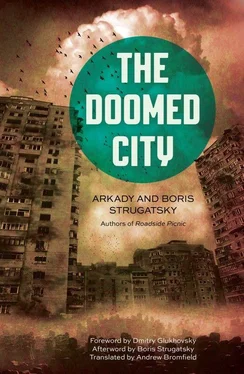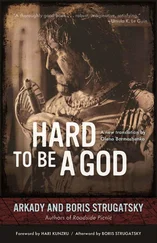But by mid-1972 this modest plan already looked impractical and even rather dangerous. The story of Vasily Grossman's remarkable epic novel Life and Fate , the manuscript of which was sent directly from the offices of the literary journal Znamya of those days to the "organs," where it sank without a trace (after all the searches and confiscations, only a single, solitary copy survived by a miracle; just a little longer and the novel would have completely ceased to exist, as if it had never even existed at all!) -- we knew this story very well, and it served as a somber warning to us. In times like that it was absolutely unwise even to take the manuscript out of the house. Even giving it to people we knew had become dangerous. And the very best thing to do, of course, was to never even mention the book's existence -- to play it safe. And so we read the draft (out loud, in our home) only to our very closest friends, and for many years everyone else who took an interest remained convinced that "the Strugatskys are writing a new novel, they've been writing it for ages, but they just can't pull themselves together and finish it."
And after the summer of 1974, after the "Heifetz-Etkind case," after the predatory gaze of the "competent authorities" stopped merely browsing through the general neighborhood and focused right in on one of the coauthors, the situation became even more threatening. A new Leningrad Case was clearly being put together in Petersburg, which meant that in theory they could come at any moment for anyone whose cover had been blown, and that would have meant (apart from everything else) the end of the novel, since it existed only as a single, solitary copy, and that was lying in the bookcase, "in plain sight," so to speak. And so in late 1974 the manuscript was hastily typed out in three copies by this author (with an indispensable proofreading being carried out at the same time) and then two copies were delivered, with every possible precaution being observed, to reliable individuals -- one Muscovite and one Leningrader. And in addition, these individuals were selected as being, on the one hand, absolutely and unimpeachably honest, above even the very slightest suspicion, and, on the other hand, not obviously numbered among our closest friends, so that if things took a turn for the worse, no one ought to come to them. Thank God, everything turned out well and nothing untoward happened, but those two copies lay there, in their "special archives," until the end of the 1980s, when we finally managed to get City published.
And even then, the very first publication (in the Leningrad journal Neva ) was no simple matter; it involved a number of neurotic compulsive maneuvers: the novel was divided into two books, and it was implied that the first book had been written a long time earlier, while the second had supposedly only just been completed. Somehow it was felt that this was important and helped (in some entirely incomprehensible manner) to pull the wool over the eyes of the Leningrad Regional Committee, which in those days no longer kept a tight stranglehold on publishers' throats but was still clutching their coattails in its sharp claws. The "first" book was published in late 1988, and the "second" in early 1989, and entirely preposterous dates of composition were given at the end of the novel. The flames of perestroika were just taking hold; new times were beginning, filled with prodigious promise but still as uncertain, unstable, and insubstantial as the light of an icon lamp fluttering in the wind.
I strongly suspect that the present-day reader is entirely incapable of understanding, let alone re-creating in his imagination, all these fears and precautionary ruses. "What's the problem?" he will ask in justified incomprehension. "What's all this fuss and bother about? Just what's so almighty shocking about this novel of yours, that you had to weave this high-tension, Frederick Forsyth-style political thriller around it?" I admit that it's not easy for me to dispel misunderstandings of this kind. The times have changed so much, and so have ideas about what is admissible and what is not in literature.
For instance, in our novel Alexander Galich is cited ("They sent the prophet up the river a short while later...") and naturally he is cited without any references, but in those days even a disguised allusion like this was absolutely unacceptable, in fact downright dangerous. It was a bomb planted under the editor, the editor-in-chief, the publishing house. Even from a distance, it's terrifying to imagine what the authorities could have done to a publisher if a quotation like that slipped through into print.
And what about our Izya Katzman -- a unequivocal Jew, and worse still, an ostentatiously provocative Jew, one of the main characters, and moreover one who constantly lectures the central character, a Russian, like some greenhorn kid, and not only lectures him but regularly defeats him in all their ideological clashes?
And the central character himself, Andrei Voronin, a Komsomol Leninist-Stalinist, a thoroughgoing communist true believer, a champion of the happiness of the common people, who evolves with such spontaneous ease into a top-ranking bureaucrat, a smooth, lordly, self-indulgent, petty chieftain and arbiter of human destiny?
And what about the instinctive ease with which this Komsomol Stalinist becomes first the good friend and then the comrade-in-arms of an inveterate Hitlerite Nazi -- and how much these apparent ideological antagonists turn out to have in common?
And the characters' seditious speculation about a possible connection between the Experiment and the problem of building communism? And the absolute ideological aberration of the scene with the Great Strategist? And the central character's utterly cynical line of reasoning about monuments and greatness? And the entire spirit of the novel, its atmosphere, permeated with doubts, disbelief, and a stubborn reluctance to glorify and acclaim anything?
Nowadays no reader or publisher is going to be astounded, let alone frightened, by all these themes, but back then, twenty-five years ago, when the authors were working on the novel, we constantly repeated to each other, like an incantation, "You have to write for the desk drawer in a way that makes it impossible to publish, but also makes it seem like there's nothing they can put you away for." At the same time, the authors realized that you could be put away for absolutely anything at any moment, even for improperly crossing the street, but nonetheless we were counting on the context of a "nonprejudicial approach," in which the order to put someone away has not yet been handed down from the top but is still only maturing, so to speak, down below.
The primary goal of our novel was not clear from the very beginning, but gradually assumed the following form: to demonstrate how, under the pressure of the circumstances of life, a young man's worldview radically changes, how he shifts from the position of an unshakable fanatic to the condition of a man suspended, as it were, in an airless ideological void, without even the slightest purchase for his feet. A life trajectory very familiar to the authors, and one which we consider not merely dramatic but also instructive. After all, an entire generation traveled this path over the period from 1940 to 1985.
How to live in conditions of ideological vacuum? How and what for? In my opinion this question remains highly relevant even today -- which is why City , despite being so vehemently politicized and so categorically of its own time, potentially remains of interest to the present-day reader -- provided that this reader has any interest at all in problems of this kind.












